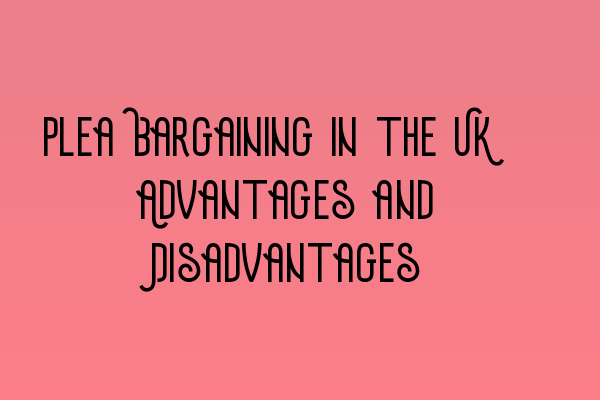Plea Bargaining in the UK: Advantages and Disadvantages
Plea bargaining is a crucial aspect of criminal law in the United Kingdom. It allows defendants to negotiate a potential plea agreement with the prosecution, avoiding a full trial. In this blog post, we will explore the advantages and disadvantages of plea bargaining in the UK.
Advantages of Plea Bargaining
1. Reduced Sentencing: One of the primary advantages of plea bargaining is the potential for reduced sentencing. By pleading guilty to a lesser charge, defendants may receive a lighter punishment compared to the potential consequences of going to trial. This can be particularly beneficial if the evidence against the defendant is strong.
2. Time and Cost Savings: Plea bargaining can save significant time and resources for both the defendant and the court. By avoiding a lengthy trial, the defendant can resolve their case more quickly, which can be especially advantageous if they are experiencing financial difficulties or if they want to minimize the emotional toll on themselves and their loved ones.
3. Avoiding Harsher Charges: In some cases, the prosecution may offer a plea deal to avoid going to trial and potentially losing the case. Accepting a plea bargain can allow the defendant to avoid facing more serious charges that may have severe consequences if they are found guilty at trial.
4. Cooperation Incentives: Plea bargains often involve defendants providing valuable information or testimony against co-conspirators or other individuals involved in criminal activities. In exchange for their cooperation, defendants may receive a reduced sentence or other benefits. This can help law enforcement agencies gather information and build stronger cases against other criminals.
Disadvantages of Plea Bargaining
1. Loss of Innocence Declaration: By pleading guilty through a plea bargain, defendants forfeit their right to declare their innocence. This can be especially difficult for individuals who believe they are wrongly accused or who have strong evidence to support their innocence.
2. Lack of Transparency: Plea bargaining takes place outside the courtroom, which means the negotiation process may not be as transparent as a formal trial. This lack of transparency can lead to concerns about unequal bargaining power and potential injustices. It is essential for defense attorneys to ensure their clients fully understand the terms and implications of the plea agreement.
3. Overuse and Pressure: Critics argue that plea bargaining is overutilized in the UK, leading to a system where the majority of cases are resolved through plea agreements rather than going to trial. This can create pressure on defendants to accept deals even when they may be innocent or have a strong case.
4. Limited Rehabilitation Opportunities: By entering into a plea agreement, defendants may miss out on rehabilitation programs or opportunities for reform that could be beneficial for their future. This is particularly relevant for individuals who may have committed a non-violent offense and would benefit from rehabilitative measures.
In conclusion, plea bargaining in the UK has both advantages and disadvantages. It can offer reduced sentencing, time and cost savings, and the opportunity to avoid more severe charges. However, it also has downsides such as the loss of innocence declaration, lack of transparency, overuse, and limited rehabilitation opportunities. If you require further information about plea bargaining or other aspects of criminal law, don’t hesitate to contact SQE Criminal Law & Practice Law UK.
For related articles, please check:
– SQE 1 Practice Exam Questions
– SQE 1 Practice Mocks FLK1 FLK2
– SQE 2 Preparation Courses
– SQE 1 Preparation Courses
– SRA SQE Exam Dates
